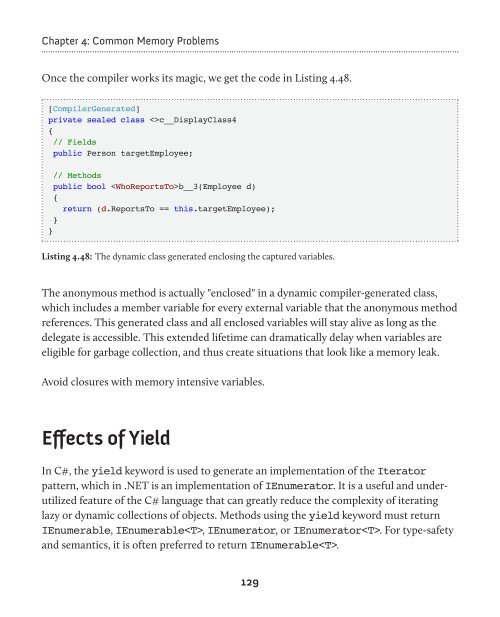Under the Hood of .NET Memory Management - Simple Talk
Under the Hood of .NET Memory Management - Simple Talk
Under the Hood of .NET Memory Management - Simple Talk
You also want an ePaper? Increase the reach of your titles
YUMPU automatically turns print PDFs into web optimized ePapers that Google loves.
Chapter 4: Common <strong>Memory</strong> Problems<br />
Once <strong>the</strong> compiler works its magic, we get <strong>the</strong> code in Listing 4.48.<br />
[CompilerGenerated]<br />
private sealed class c__DisplayClass4<br />
{<br />
// Fields<br />
public Person targetEmployee;<br />
// Methods<br />
public bool b__3(Employee d)<br />
{<br />
return (d.ReportsTo == this.targetEmployee);<br />
}<br />
}<br />
Listing 4.48: The dynamic class generated enclosing <strong>the</strong> captured variables.<br />
The anonymous method is actually "enclosed" in a dynamic compiler-generated class,<br />
which includes a member variable for every external variable that <strong>the</strong> anonymous method<br />
references. This generated class and all enclosed variables will stay alive as long as <strong>the</strong><br />
delegate is accessible. This extended lifetime can dramatically delay when variables are<br />
eligible for garbage collection, and thus create situations that look like a memory leak.<br />
Avoid closures with memory intensive variables.<br />
Effects <strong>of</strong> Yield<br />
In C#, <strong>the</strong> yield keyword is used to generate an implementation <strong>of</strong> <strong>the</strong> Iterator<br />
pattern, which in .<strong>NET</strong> is an implementation <strong>of</strong> IEnumerator. It is a useful and underutilized<br />
feature <strong>of</strong> <strong>the</strong> C# language that can greatly reduce <strong>the</strong> complexity <strong>of</strong> iterating<br />
lazy or dynamic collections <strong>of</strong> objects. Methods using <strong>the</strong> yield keyword must return<br />
IEnumerable, IEnumerable, IEnumerator, or IEnumerator. For type-safety<br />
and semantics, it is <strong>of</strong>ten preferred to return IEnumerable.<br />
129











